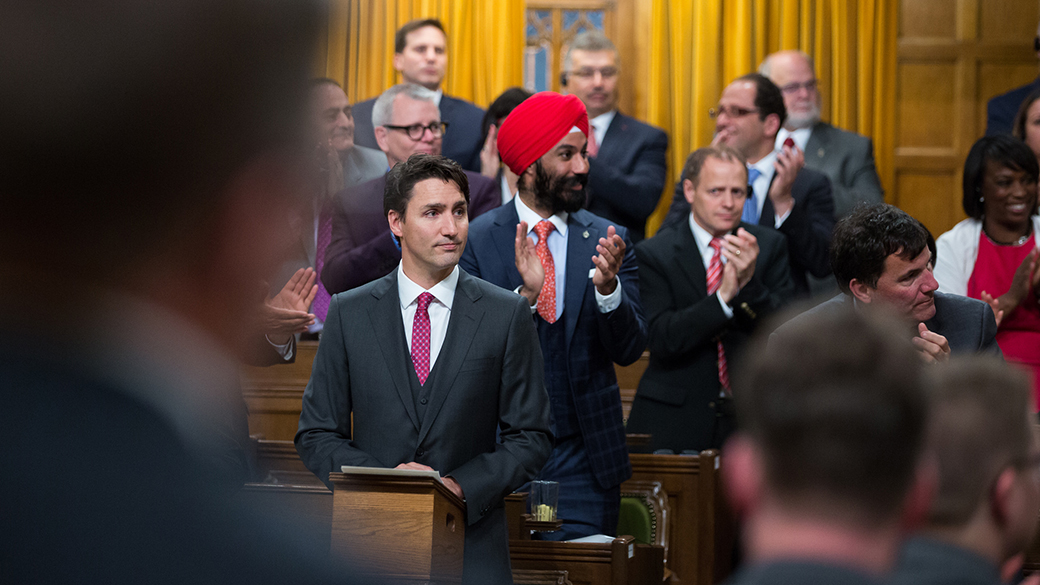
CHECK AGAINST DELIVERY
Mr. Speaker, I would like to begin by acknowledging the hard work done by many of my colleagues.
From my own caucus, I’d like to thank the Members from Surrey-Newton and Winnipeg North for their tireless advocacy. They have petitioned the Canadian government for years to make the apology that will be made today. I thank them for their commitment to this cause.
From the Opposition benches, special mention must be made of the Members from Calgary Heritage, Calgary Midnapore and the former Member for Surrey North. Each deserves recognition for the work they have done to seek resolution for victims and their families.
As do the many organizations that have sought the same, in particular, the Professor Mohan Singh Memorial Foundation.
Mr. Speaker, today I rise in this House to offer an apology on behalf of the Government of Canada, for our role in the Komagata Maru incident.
More than a century ago, a great injustice took place.
On May 23, 1914, a steamship sailed into Burrard Inlet in Vancouver. On board were 376 passengers of Sikh, Muslim and Hindu origin.
Those passengers, like millions of immigrants to Canada since, came seeking better lives for their families. Greater opportunities. A chance to contribute to their new home.
Those passengers chose Canada. And when they arrived here, they were rejected.
They were rejected because in the early years of the last century, the Government of Canada put in place a law that prohibited passengers from disembarking in Canada if the vessel they were on had stopped at any point during its journey here.
This would have prevented immigrants from faraway countries such as India from entering Canada, because in that era, it was impossible to travel great distances by sea without making any stops.
Because of this law, when the Komagata Maru arrived in Canada, only a small number of passengers were allowed to disembark. The ship, and all remaining passengers on it, was ordered to leave.
Members of the local Sikh community tried to convince authorities to reverse their decision, but those efforts were unsuccessful.
And on July 23, 1914 – two months after it arrived – the Komagata Maru was escorted out of harbour by the Canadian military, and forced to return to India, where 19 passengers were killed and many others imprisoned.
Mr. Speaker, Canada does not bear alone the responsibility for every tagic mistake that occurred with the Komagata Maru and its passengers.
But Canada’s government was, without question, responsible for the laws that prevented these passengers from immigrating peacefully and securely.
For that, and for every regrettable consequence that followed, we are sorry.
I apologize, first and foremost, to the victims of the incident.
No words can fully erase the pain and suffering they experienced. Regrettably, the passage of time means that none are alive to hear our apology today.
Still, we offer it, fully and sincerely.
For our indifference to your plight.
For our failure to recognize all that you had to offer.
For the laws that discriminated against you, so senselessly.
And for not formally apologizing sooner.
For all these things, we are truly sorry.
I also wish to apologize to the descendants of the passengers of the Komagata Maru, including those who are here with us here today.
We can never know what your lives would have been like had your relatives been welcomed to Canada.
The ways in which your lives would have been different.
The ways in which Canada would have been enriched.
Those possibilities are lost to history.
For that – and to you – we apologize.
Just as we apologize for past wrongs, so too must we commit ourselves to positive action – to learning from the mistakes of the past, and to making sure that we never repeat them.
That is the unique promise and potential of Canada.
We believe that every person – no matter who they are, no matter where they came from – deserves a real and fair chance at success. Canada’s South Asian community exemplifies this success every day.
We believe that our diversity is a source of strength. That we are strong not in spite of our differences, but because of them.
And we believe in the values enshrined in our Charter of Rights and Freedoms, including multiculturalism. Our government will ensure that these values are always upheld.
Mr. Speaker, before I finish, I would like to acknowledge one more Member who has helped to bring the Komagata Maru incident to our national attention – the Minister of National Defence.
Before entering political life, the Minister was the commanding officer of The British Columbia Regiment Duke of Connaught’s Own – the same regiment that once forced out the Komagata Maru.
A century ago, the Minister’s family might well have been turned away from Canada. Today, the Minister sits beside us, here, in this House.
In a House that includes immigrants. That includes the daughters and sons – the granddaughters and grandsons – of immigrants.
The very makeup of this House should remind all of us that when we have the choice between opening our arms to those in need or closing our hearts to them, we must always choose the more compassionate path.
When we see injustice, we must speak up, and attempt to make things right.
When we make mistakes, we must apologize, and recommit ourselves to doing better.
Mr. Speaker, Canada is a country unlike any other. We are blessed to call it home.
Let us always endeavour to do better, and to be better.
Let us do that in honour of the victims of the Komagata Maru incident, and every courageous person who leaves behind family and familiar things, to bring to Canada the very best of who they are.
Thank you.

